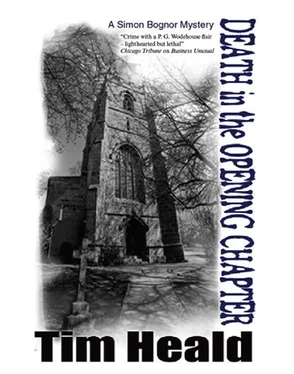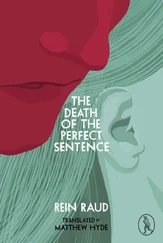Tim Heald - Death in the opening chapter
Здесь есть возможность читать онлайн «Tim Heald - Death in the opening chapter» весь текст электронной книги совершенно бесплатно (целиком полную версию без сокращений). В некоторых случаях можно слушать аудио, скачать через торрент в формате fb2 и присутствует краткое содержание. Жанр: Криминальный детектив, на английском языке. Описание произведения, (предисловие) а так же отзывы посетителей доступны на портале библиотеки ЛибКат.
- Название:Death in the opening chapter
- Автор:
- Жанр:
- Год:неизвестен
- ISBN:нет данных
- Рейтинг книги:5 / 5. Голосов: 1
-
Избранное:Добавить в избранное
- Отзывы:
-
Ваша оценка:
- 100
- 1
- 2
- 3
- 4
- 5
Death in the opening chapter: краткое содержание, описание и аннотация
Предлагаем к чтению аннотацию, описание, краткое содержание или предисловие (зависит от того, что написал сам автор книги «Death in the opening chapter»). Если вы не нашли необходимую информацию о книге — напишите в комментариях, мы постараемся отыскать её.
Death in the opening chapter — читать онлайн бесплатно полную книгу (весь текст) целиком
Ниже представлен текст книги, разбитый по страницам. Система сохранения места последней прочитанной страницы, позволяет с удобством читать онлайн бесплатно книгу «Death in the opening chapter», без необходимости каждый раз заново искать на чём Вы остановились. Поставьте закладку, и сможете в любой момент перейти на страницу, на которой закончили чтение.
Интервал:
Закладка:
‘I was warned you were old-fashioned,’ said the pathologist, taking umbrage. ‘I hadn’t realized you were prehistoric.’
Bognor shrugged. He was past caring.
‘Listen sunshine,’ he said, wishing he were with his wife and the Fludds listening to the brigadier bark on equally ludicrously about a subject on which he was no expert either, but making it sound, by dint of slides, statistics and sundry other devices, as if he knew what he was talking about, ‘you do your job and I’ll do mine.’ On reflection, the brigadier and the pathologist had a great deal in common, pretending to a level of expertise which was essentially bogus, but relying on it, and sundry more or less false qualifications, to claim a level of competence which excluded the common man. This included people such as Bognor. Bognor, however, had the advantage of an Apocrypha education, an enquiring mind and the ability to cut through the sort of crap offered up by the pathologist and the brigadier. Give him a good generalist, any time. Which was not to say that he didn’t acknowledge the place of the genuine authority, but they were few and far between, and life was dogged by the half-baked, semi-qualified – such as the brigadier and the pathologist – masquerading as experts, when in fact they knew a great deal less than men of the world, such as Simon.
All this flashed through his mind, as he poured professional scorn on the pathologist, while heeding warnings about doing things according to the book of rules, not antagonizing people such as pathologists without good reason and much else besides. There was a lot going on beneath those beetling brows and that affable mildly bovine exterior. Still waters run deep, and his waters were stiller and ran deeper than anyone, except possibly his wife, quite realized.
‘I shall report you,’ said the pathologist. ‘I’m not used to being spoken to like this.’
‘More’s the pity,’ said Bognor before he could help himself. A still small voice, probably Monica’s, was telling him that they were all in this together and it wouldn’t do to make enemies of one’s own team. The voice was running deep.
‘Look,’ Bognor was being placatory. He even thought of putting a hand on the pathologist’s shoulder, but decided against it. The gesture could have been misinterpreted, but was almost bound to seem inflammatory. ‘You and I are never going to agree. I have your report, for which many thanks. Now, I shall go off and carry on with my job. You’ve done yours and I’m properly grateful.’
‘You’ll ignore what I said,’ complained the pathologist, obviously far from mollified. ‘People like you are all the same. You should have gone out with the Ark.’
‘We did,’ said Bognor, ‘in a manner of speaking. There are very few people like me left. You and your kind are the masters now.’
‘Not before time.’ The pathologist spoke with feeling. ‘Our job is to present cold scientific facts about which there can be no argument. We don’t allow ourselves the luxury of arty-farty feelings and speculation, much less intuition, as you seem to call it. People like you fly by the seat of your pants, which is an apt simile if you ask me. Seat of your pants is exactly what you’re all about.’
‘It’s a metaphor not a simile,’ said Bognor, ‘though I wouldn’t expect you to know the difference. Nor care, even if you knew.’ This was a proverbial red rag to the equally proverbial bull, and he knew it. But he couldn’t care less.
‘So, who do you think did it?’ asked the pathologist.
‘I don’t know,’ said Bognor, truthfully.
The pathologist looked at him sceptically.
‘But you think you know,’ he said, eventually. It was said accusingly.
‘No,’ said Bognor, ‘at the moment I simply don’t have the foggiest. But, unlike some people, I have an open mind. And I value that. And I shall endeavour to hang on to it.’
‘Meaning?’
‘Meaning that I don’t.’
‘I didn’t say that.’
‘But you implied it,’ said Bognor. ‘So who’s being unscientific now?’
They glowered at each other. They were involved in some sort of stand-off, and Bognor wondered idly, as was his wont, whether or not it was Mexican. If so, then part of the definition was that neither party could win, and the inevitable result was some kind of mutually assured destruction. There was nothing particularly Mexican about a situation such as this. Indeed, a dictionary from another place suggested that the term was invented by Australians who, in this instance, at least, knew absolutely nothing about which they were allegedly talking. His own understanding was that a number of terms had the word Mexican inserted by Americans from north of the border, and that this was nothing more than an expression of racial contempt of the kind habitually used by the English about everyone else. It was merely an expression of superiority. In this instance, it suggested that there was no way out of the situation. There was nothing more Mexican about it than, for instance, a Mexican spit roast, which was a very rude expression, given a racial significance by the fact that the men concerned habitually sported sombreros, which were a form of Mexican national headgear, as distinctive and unusual as the Zapata moustache or tequila.
All this flashed through Bognor’s mind, as he realized that he had insulted the pathologist and the only way out was for him to apologize. If he did, the matter should be resolved and the stand-off would cease to be Mexican, in the generally accepted sense.
‘I’m sorry,’ he said, but the pathologist was not to be defused so easily. As far as he was concerned, the stand-off was indeed Mexican and there was no way out.
‘People like you always say things like that,’ he said.
‘I only apologized.’
‘Exactly,’ said the pathologist. ‘Typical. You think you can be as rude as you bloody well like, and that you can then apologize, which makes it all right. Well, it doesn’t. Life isn’t like that.’
‘No,’ said Bognor, feeling even more confused. ‘You’re right. It isn’t. Maybe I should make myself plain.’
‘I wish,’ said the pathologist.
‘What I mean,’ said Bognor, sighing inwardly, because he knew this was going to make a bad situation worse, ‘is that I believe that murder and its solution is, on the whole, and as a general rule, not a rational matter, and, as such, is not susceptible to rational analysis.’
‘I disagree,’ said the pathologist.
‘Of course you do,’ said Bognor, irritating his opponent still more. ‘That’s your job. I wouldn’t expect anything else.’
‘Just because murder is usually committed in a non-rational, whimsical manner and for similar reasons, doesn’t mean to say that it’s not subject to rational scientific laws. That’s what my colleagues and I provide.’
‘Up to a point,’ agreed Bognor. ‘But, with respect, it’s quite a limited point.’
‘What do you mean by that?’ The pathologist didn’t really want to know. He was buying argumentative moments. Calling an intellectual time out.
‘What I mean,’ said Bognor speaking very slowly, as if to a foreigner, halfwit or small child, ‘is that death isn’t about scalpels and dissection, and positions of bodies and times of death; it’s about matters of far greater importance and far greater complexity.’ He seemed briefly to backtrack but didn’t, in fact. ‘I concede,’ he admitted, ‘that people, such as yourself, have a part to play in an investigation such as this, but it’s a small part, a subsidiary part and not even necessarily a relevant part.’
‘I don’t agree,’ said the pathologist, desperately.
‘Well, if you think you can tell who killed the Reverend Sebastian Fludd because of what you have found in his stomach, or the sort of knot used to tie the rope to the beam, or to any one of a number of sexy but silly things you have discovered because of your so-called scientific procedures, then you are even more ridiculous than I think you are. Thank you for your report, which is required by law and by convention, and will no doubt make very interesting reading, but will be of no help whatever in determining who killed the dead man or why.’
Читать дальшеИнтервал:
Закладка:
Похожие книги на «Death in the opening chapter»
Представляем Вашему вниманию похожие книги на «Death in the opening chapter» списком для выбора. Мы отобрали схожую по названию и смыслу литературу в надежде предоставить читателям больше вариантов отыскать новые, интересные, ещё непрочитанные произведения.
Обсуждение, отзывы о книге «Death in the opening chapter» и просто собственные мнения читателей. Оставьте ваши комментарии, напишите, что Вы думаете о произведении, его смысле или главных героях. Укажите что конкретно понравилось, а что нет, и почему Вы так считаете.












